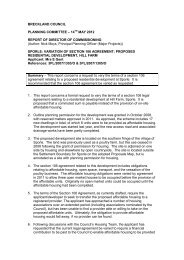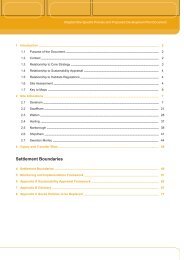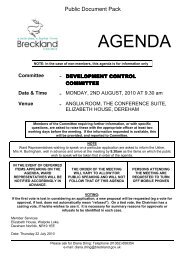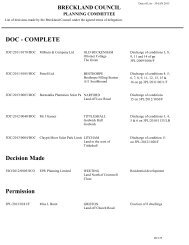Public reports pack PDF 633 KB - Breckland Council
Public reports pack PDF 633 KB - Breckland Council
Public reports pack PDF 633 KB - Breckland Council
You also want an ePaper? Increase the reach of your titles
YUMPU automatically turns print PDFs into web optimized ePapers that Google loves.
BRECKLAND COUNCIL – PLANNING COMMITTEEPLANNING POLICY NOTETHE STRENGTH OF PLANNING POLICY IN DETERMINING PLANNING APPLICATIONSThe Planning process is set up, IN THE PUBLIC INTEREST, to protect the public from the unacceptableplanning activities of private individuals and development companies. Planning is primarily concerned to dealwith issues of land use and the way they affect the environment.The <strong>Council</strong> has a DUTY, through the Planning & Compulsory Purchase Act 2004, to prepare Local DevelopmentDocuments (DPDs) to provide a statutory framework for planning decisions. The Development Plan for <strong>Breckland</strong>currently consists of a suite of documents. The primary document which sets out the overarching planning strategyfor the District and the local planning policies is the Core Strategy and Development Control Policies document. Thiswas adopted by <strong>Breckland</strong> <strong>Council</strong> on 17 th December 2009 and is the local starting point in the determination ofplanning applications. <strong>Breckland</strong> <strong>Council</strong> has also adopted its Site Specific Policies and Proposals DPD, on 19 thJanuary 2012. The document allocates specific areas of land for development and revised settlement boundaries.<strong>Breckland</strong>’s Plan contains the <strong>Council</strong>’s planning policies, which must be consistent with Government policy which iscurrently the National Planning Policy Framework (NPPF) and accompanying technical guidance.The full public scrutiny of the <strong>Council</strong>’s proposals will give the Plan an exceptional weight when dealing with planningapplications.This shift towards a “Plan-led” planning system is a major feature of planning legislation. The Planning & CompulsoryPurchase Act 2004, states that planning applications should be determined in accordance with the policies ofthe Plan, unless material considerations which are relevant to planning indicate otherwise.The NPPF states that the purpose of the planning system is to achieve sustainable development. The core planningprinciples contained within the NPPF are summarised as:• To be genuinely plan led• To drive and support sustainable economic development• Seek high quality design• Conserve and enhance the natural environment• Encourage the effective use of land• Conserve heritage assetsUnless there are special reasons to do otherwise, planning permissions “run with the land”, and are NOT personallicences.The factors to be used in determining applications will relate to the effect on the “public at large” and will NOT bethose that refer to private interests.Personal circumstances of applicants “will rarely” be an influencing factor, and then, only when the planning issuesare “finely balanced”.THEREFORE we will:• acknowledge the strength of our policies,• be consistent in the application of our policy, and• if we need to adapt our policy, we should do it through the LDF process.Decisions which are finely balanced, and which contradict policy will be recorded in detail, to explain andjustify the decision, and the strength of the material planning reasons for doing so.LOCAL COUNCILSOCCASIONALLY, THERE ARE CONFLICTS WITH THE VIEWS OF THE PARISH OR TOWN COUNCIL. WHY ISTHIS?We ask local parish and town councils to recognise that comments received are taken into account. Where wedisagree with those comments it will be because:• Districts look to “wider” policies, and national, regional and county planning strategy.• Other consultation responses may have affected our recommendation.• There is an honest difference of opinion.
















